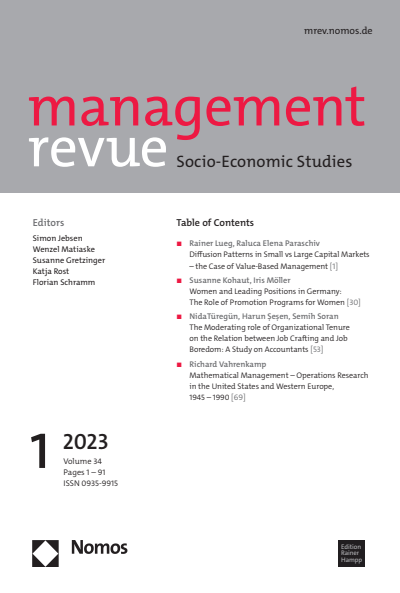德国妇女和领导职位:妇女晋升计划的作用
IF 1.7
0 MANAGEMENT
引用次数: 0
摘要
虽然妇女受教育程度与男子一样高,但她们在管理部门的比例不能反映她们在劳动力中所占的比例。显然,需要不同行为者的政策来帮助女性晋升到领导职位。本文解决的问题是,是否引入和存在的特殊晋升计划的妇女影响的概率达到一个管理职位。社会角色和期望状态理论解释了为什么女性很难晋升到领导职位。在组织层面上,“同质性原则”导致国家依赖,这是男性领导持续存在的一个解释。因此,有人认为妇女需要特殊的机会来展示她们的技能。指导项目可能是支持女性职业生涯的一种方式。在多变量分析中,估计probit模型来模拟促销计划对达到领先地位的概率的影响。这些估计是基于德国的雇主-雇员关联数据集,该数据集涵盖了在3240家企业就业的近14.2万名女性。该数据集涵盖了2008年至2014年的时间,并允许控制个人和公司特定的变量。研究结果表明,女性友好政策的引入增加了女性获得管理职位的可能性,而此类项目的存在并没有产生影响。本文章由计算机程序翻译,如有差异,请以英文原文为准。
Women and Leading Positions in Germany: The Role of Promotion Programs for Women
Although women are as well educated as men, they do not reach a proportion in management that reflects their workforce share. Obviously, different actors' policies are required to help promote women to leading positions. This paper addresses the question of whether the introduction and existence of special promotion programs for women impact the probability of reaching a management position. Social role and expectation state theory argue why it is difficult for women to rise to leadership positions. On the organisational level, the "homophily principle" leads to state dependence which is one explanation for the persistence of male leadership. Hence, it is argued that women need special opportunities to demonstrate their skills. Mentoring programs could be one way to support women in their careers. In multivariate analyses, probit models are estimated to model the influence of promotion programs on the probability of reaching a leading position. The estimations are based on a German linked employer-employee dataset of almost 142,000 women employed in 3,240 establishments. The dataset covers the time from 2008 to 2014 and allows to control for individual and firm-specific variables. The results show that the introduction of women-friendly policies increases the probability of reaching a managerial position, whereas the existence of such programs does not have an impact.
求助全文
通过发布文献求助,成功后即可免费获取论文全文。
去求助
来源期刊

Management Revue
MANAGEMENT-
CiteScore
1.20
自引率
0.00%
发文量
7
期刊介绍:
Management Revue - Socio-Economic Studies is an interdisciplinary European journal that undergoes peer review. It publishes qualitative and quantitative work, along with purely theoretical papers, contributing to the study of management, organization, and industrial relations. The journal welcomes contributions from various disciplines, including business and public administration, organizational behavior, economics, sociology, and psychology. Regular features include reviews of books relevant to management and organization studies.
Special issues provide a unique perspective on specific research fields. Organized by selected guest editors, each special issue includes at least two overview articles from leaders in the field, along with at least three new empirical papers and up to ten book reviews related to the topic.
The journal aims to offer in-depth insights into selected research topics, presenting potentially controversial perspectives, new theoretical insights, valuable empirical analysis, and brief reviews of key publications. Its objective is to establish Management Revue - Socio-Economic Studies as a top-quality symposium journal for the international academic community.
 求助内容:
求助内容: 应助结果提醒方式:
应助结果提醒方式:


